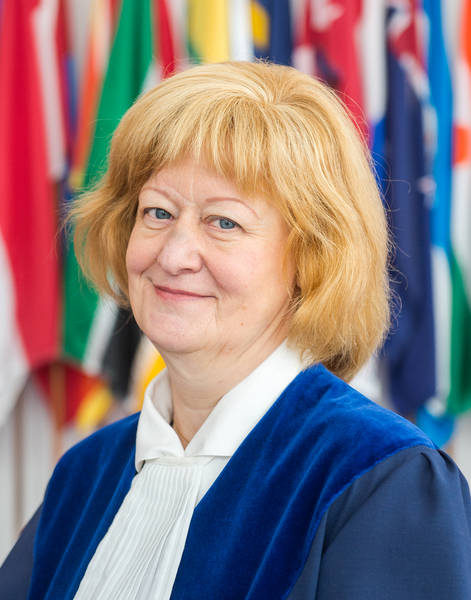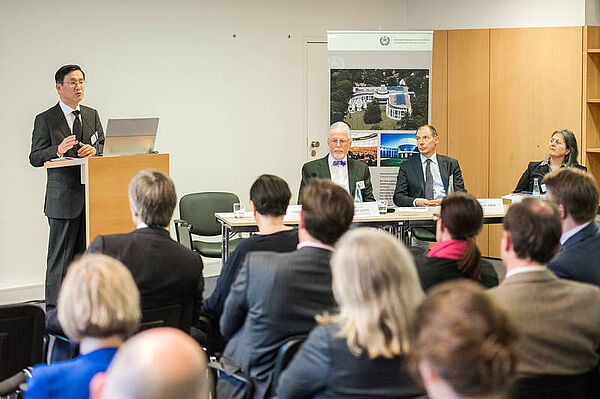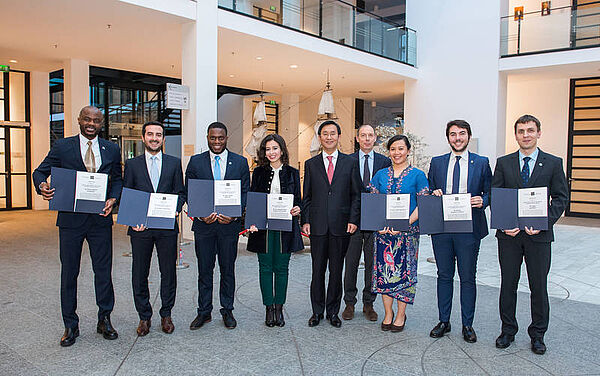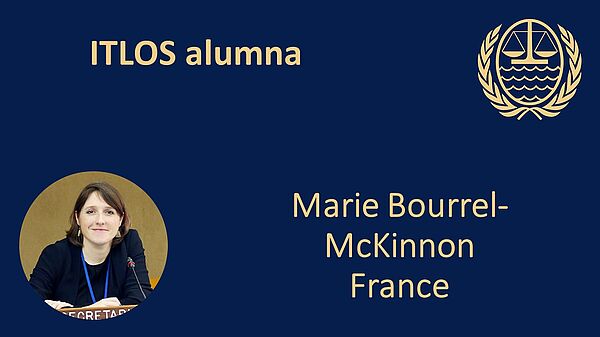Newsletter 2018/2
May 2018
Introduction
I am very pleased to welcome you to the Tribunal’s second newsletter, keeping you up to date with the latest ITLOS activities both, in Hamburg and further afield. As the newsletter goes out we have just returned from Cabo Verde where we held our thirteenth regional workshop for government experts working in the maritime field. Following on from workshops in Dakar, Kingston, Libreville, Singapore, Bahrain, Buenos Aires, Cape Town, Fiji, Mexico City, Nairobi, Bali and San José, the aim of this workshop was to provide insight into the procedures for the peaceful settlement of disputes related to the law of the sea, as enshrined in the United Nations Convention on the Law of the Sea, with special attention given to the jurisdiction of the Tribunal and the procedure for bringing disputes before it. Delegations from the Ministries of Foreign Affairs, Justice, Fisheries, Transport and the Marine Environment of West and Central African States have been given presentations on the procedure for bringing cases before the Tribunal, have an introduction to its case law, and attend sessions on provisional measures and the prompt release of vessels and crews and advisory proceedings before the Seabed Disputes Chamber and the Tribunal. We have also addressed two substantive issues particularly relevant to the West and Central African States: maritime boundary delimitation and IUU fishing.
Let me highlight a few of the Tribunal’s events which took place during the past three months: in March, the Tribunal held its regular administrative session and adopted its budget proposals and annual report. They will now be submitted to the Meeting of States Parties, to be held in June 2018 at United Nations Headquarters. We also recently published a booklet from the twentieth anniversary symposium held at the Tribunal on 18 March 2017, entitled "ITLOS at 20: Looking into the future". The booklet includes the speakers' contributions and the discussions from the question and answer sessions. It is available on the Tribunal’s website.
A round table discussion was held on 28 March 2018 on "Proceedings available at ITLOS in cases involving the arrest and detention of vessels" for representatives of top maritime law firms. More information on this event is included below under "Conferences and events".
I would also like to mention the Tribunal’s first steps into the realm of social media. Recognizing the need for greater transparency in an increasingly digitalized world, the Tribunal has established profiles on both Twitter and LinkedIn in order to facilitate communicating ITLOS news to our followers. You can now follow us on Twitter and LinkedIn.
I hope that you enjoy reading the newsletter.
With my warmest regards,
Jin-Hyun Paik
President
ITLOS cases
In the M/V “Norstar” Case (Panama v. Italy), Italy’s rejoinder is expected to be submitted by 13 June 2018. This submission will close the written phase of the case. In accordance with article 67 of the Rules, copies of the pleadings and documents annexed thereto shall be made accessible to the public on the opening of the oral proceedings, which is planned for September 2018.
ITLOS bench: Interview with Judge Lijnzaad (The Netherlands)

As a recently elected Judge I am settling into a different role and pace, it is of course different to that of my previous position as Legal Advisor for the Ministry of Foreign Affairs. I have enjoyed the contact with the 20 judges during the last couple of administrative sessions and in particular during the initial deliberations in the M/V "Norstar" Case (Panama v.Italy) which we are currently working on. A judge has the luxury of more time to reflect, is able to dedicate that time to the extensive pleadings submitted in cases, to research around the topic in order to be in a position to deliberate fully on the case at hand, and it is what parties expect us to do. I am looking forward to the upcoming hearings and ensuing deliberations in the Panama/Italy case and any other cases which might be placed before the Tribunal.
Also I am happy to find that the Tribunal is reflecting on contemporary developments in the law of the sea. As a diplomat I used to be very engaged with issues such as marine biodiversity, IUU fishing or sea-level rise. It has been good to see how the Tribunal is following these issues, and is indeed preparing for whatever may come our way related to these developments. I like this spirit of wanting to be prepared for, and be knowledgeable about current issues.
There are now three female judges on the ITLOS bench, the first female Judge at the Tribunal was Elsa Kelly (Argentina), elected back in 2011. Judge Neeru Chada (India) was sworn in as a judge together with me on 2 October last year. With the Tribunal already in existence for 21 years it has taken some time to achieve this representation but we are certainly moving in the right direction! Gender balance is a topic that touches me – often talented women are overlooked when States look for candidates for judicial positions. That is a pity – it is a well-established fact that mixed and diverse groups are better at achieving results and I believe this is also the case for tribunals and courts. In my view the international bench can only benefit from a good mix of experience and expertise amongst judges, greater diversity, with a representation of a wide variety of judicial and cultural backgrounds, nationality and of gender. Also the Convention on the Elimination of all Forms of Discrimination of Women speaks about women’s equal participation in international affairs – this clearly also includes international courts and tribunals. There are plenty of capable female law of the sea experts out there, working for their governments, for international organizations or in academia. It is not the lack of capable candidates, but rather the failure to notice them or to actively look for female candidates. My interest is not about just electing a woman for the sake of it, but about ensuring that qualified female candidates are found on the basis of a selection process that is aware of the potential bias in such processes.
If I turn to my personal view for the Tribunal’s future, it is a dispute-settlement mechanism that is ready for use – and it could be used much more. The Tribunal has different procedures to offer and perhaps we must do more to clarify the possible procedures, there is probably a lack of understanding about what is possible in Hamburg.
I would like to highlight in particular the possibility for States to establish a special chamber of the Tribunal to deal with a specific dispute. States may want to take more advantage of this mechanism if it is better known. A special chamber of just five Judges could perhaps be perceived as less intimidating, and may be able to act swifter than the whole bench of 21. Looking at the work of the chamber created to deal with the Ghana/Côte d’Ivoire maritime delimitation case, I think that the agile and flexible method of work demonstrated by the chamber shows just how attractive this avenue could be to States.
ITLOS conferences and events

A round table discussion on "Proceedings available before the International Tribunal for the Law of the Sea in cases involving the arrest and detention of vessels" was held at the Tribunal for a select group of maritime lawyers on 28 March 2018. During this discussion, presentations were given on compensation cases before the Tribunal for the arrest and detention of vessels, the relevance of provisional measures proceedings as an “alternative avenue” in cases involving the arrest and detention of vessels, the prompt release procedure as an “efficient tool” in specific cases of arrest and detention, and the possibilities the Tribunal can offer the shipping community.
On 17 March 2018, the International Foundation for the Law of the Sea ("IFLOS") held its 12th maritime talks at the Tribunal on the topic "Migrants at sea: Practical and legal aspects of the refugee situation in the Mediterranean". The diverse approaches to this topic became apparent over the course of the event, from Judge Heidar's presentation of the relevant law of the sea regulations to the day-to-day challenges faced by those working in the Mediterranean, and the political and naval perspectives provided by representatives of the German Armed Forces and EUNAVFOR MED's Operation Sophia.
The statements are available on the IFLOS website.
The Tribunal was represented by the President and Judge Heidar at the recent annual meeting of the American Society of International Law (ASIL) in Washington. President Paik participated in the session on "Adjudicators, negotiators, and the evolution of maritime delimitation law" on 6 April 2018, while Judge Heidar spoke at the session on "International law as a tool in the fight against IUU fishing and seafood slavery".
At a conference on "Regime interaction in ocean governance: Problems, theories and methods", organized by the Utrecht Centre for Water, Oceans and Sustainability Law, the European Research Council and the University of Utrecht, Judge Lijnzaad chaired a session on "The many facets of ocean governance".
President Paik gave a lecture entitled "The UNCLOS dispute-settlement system and ITLOS" at the University of Hamburg on 11 April 2018.
The Registrar, Mr Philippe Gautier, took part in the Spring School & Conference in Turin, Italy, on "The use of force at sea". On that occasion, the Registrar gave a presentation on the Tribunal's jurisprudence relating to law-enforcement activities.
Capacity building

ITLOS-Nippon Foundation Capacity-building and training programme on dispute settlement under UNCLOS
Seven fellows successfully completed the nine-month programme in March this year, having followed a series of lectures, study visits and workshops and conducted research on a topic of their choice. The closing ceremony of the 2017/2018 programme was held during the Tribunal’s March administrative session, at which the fellows presented their research papers to the Judges and invited guests. The topics covered were: The Greek-Turkish maritime delimitation dispute in the Aegean Sea; IUU fishing: a Trinidad and Tobago perspective; Re-emphasizing the common oceans: Towards drafting a new implementing agreement under UNCLOS on Biodiversity Beyond National Jurisdiction; The Russian Federation’s declarations made under Articles 287 and 298 of UNCLOS; The rights and obligations of States in undelimited maritime areas and the ‘Predominant interest’ concept; The maritime delimitations of Spain; and the Limites de l´opérationnalisation des traitements spéciaux et différenciés dans le contexte de la partie XI de la CNUDM.
The Tribunal is grateful to the Nippon Foundation for its continued support. The selection procedure for the 2018/2019 programme is under way and the Tribunal looks forward to welcoming a new group of fellows in July. Further details about the upcoming programme and information on how to apply may be found here.
The interns who were with us from January to March departed after a busy three months, researching their chosen topics, such as ‘Scientific and technical evidence in international disputes relating to the environment; Protection of the marine environment in times of armed conflict; and UNCLOS tribunals’ jurisdiction over mixed disputes. The interns also attended some of the lectures and presentations with the Nippon fellows and met the Judges during the March administrative session.
In April, we welcomed four new interns to the Legal Office and the Press Office: Callee Anne Davis (South Africa); Afef Kouass (Tunisia); Nataliia Leshchenko (Ukraine); and Marian Schulte-Orlet (Germany/Switzerland).
In March 2018, President Paik and Deputy Registrar Hinrichs participated as judges in the final of the 2018 German National Rounds of the Philip C. Jessup International Law Moot Court Competition hosted by the Walther-Schücking Institute at the University of Kiel, concerning the case The Egart and the Ibra. Congratulations to the winning team from the Ludwig Maximilian University of Munich.
Meet ITLOS alumni

Marie Bourrel-McKinnon (France), ITLOS intern in 2007 and Nippon fellow in 2011/2012, currently working as the Senior Policy Officer - Special Assistant to the Secretary-General of the International Seabed Authority
I became an intern at ITLOS in July 2007, only a few days before two cases on prompt release for a vessel were submitted. The experience would prove to be fantastic. I have been on other internships before and since, and I have to say that none of them provided me with so much exposure to the practice of international law, particularly in the context of settlement of international disputes.
This is probably the reason why I applied for the NIPPON Fellowship Programme a few years later. I remember being so happy and grateful when I learnt that I had been selected. The year spent as a “Nippon Fellow” was life-changing: not only because the courses and experiences offered to us really helped me build my own knowledge in the discipline, but also because of the intensity of the whole experience. With the other fellows, we formed a very united group, which again proved to be a wonderful thing as I would go on to learn from them and through them. Of course, the main privilege came from the lectures given either at the Tribunal itself, by the Judges and the Legal Officers, or in other places such as the Max Planck Institute in Heidelberg, the Université de Bretagne in Brest and in The Hague. The different study trips organised throughout the programme were also very interesting and additionally offered valuable opportunities for meeting a range of experts and professionals, with whom I am still in contact.
The overall experience – the teachings, the human contact, the unique environment – proved to be more valuable than the sum of its parts, a sort of growth and development by osmosis. It would prove to be instrumental in the long run, as these things are, when I returned to France soon after, but even more so when I worked for a few years for the Secretariat of the Pacific Community (SPC), the principal technical and scientific organisation in the Pacific. SPC supports the sustainable development efforts of 22 Pacific Island countries and territories through knowledge-based programmes of technical assistance and policy advice. My position was Policy and Legal Adviser to the Governments in the development of their maritime transport regulatory frameworks and then, in relation to the development of national policies and legislations governing deep-seabed activities. And today I know I still draw from the experience in my role as Senior Policy Officer and Special Assistant to the Secretary-General of the International Seabed Authority.
So as you can see I cannot say enough good things about the ITLOS programme, and I would warmly encourage young lawyers to apply!
Upcoming events
Hamburg’s Consular Night (open evening)/Lange Nacht der Konsulate, Hamburg
The Tribunal will be taking part in this annual event organized by the Senate of Hamburg, opening its doors to the public on 15 May 2018.
See the Hamburg Senate website
42nd Annual Conference of the Center for Oceans Law and Policy, Beijing
Judge Gao will sit on the panel "Spotlight on regional cooperation" and President Paik will moderate the panel on shipping on 24 and 25 May, respectively.
See the Conference website
28th Meeting of States Parties, New York
The annual meeting of States Parties to the United Nations Convention on the Law of the Sea will take place from 11 to 14 June 2018.
See the DOALOS website
New knowledge and changing circumstances in the law of the sea conference, Reykjavik
President Paik will give the keynote speech at the conference, which is being organized by the Law of the Sea Institute of Iceland and the Korea Maritime Institute. Judge Hoffmann will also be speaking at the conference, which will be held from 28 to 30 June 2018.
See the Conference website
Rhodes Summer Academy, Rhodes
President Paik and Judges Cot, Hoffmann and Heidar will be lecturing at this upcoming event.
See the Rhodes Academy website
IFLOS Summer Academy, Hamburg
While the programme has yet to be announced, as every year, Judges of the Tribunal and the Registrar will be lecturing during the two-week law of the sea module of the academy.
See the Summer Academy website

